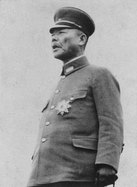Kuniaki Koiso (22 Mar. 1880 - 3 Nov. 1950)

A retired Chief of Staff of the Kwantung Army, Kuniaki Koiso served as the Governor-General of Korea between 1942 and 1944. In this position he became unpopular because of conscription which forced Koreans to join the Imperial Japanese military. Before this he was Minister of Colonial Affairs for two non-consecutive terms in 1939 and 1940.
July of 1944 saw Koiso replace Tojo as Prime Minister of Japan, following the latter’s downfall. He was not the most popular candidate; however he was the only one who could be generally agreed upon. His reign saw him as a mere figurehead, as military decisions were taken without his involvement, and he was generally unpopular among both pacifists and those who favoured war.
In late 1944 and the beginning of 1945, Koiso attempted to take more control over military affairs following his failures to find a peaceful solution. When his attempts to become War Minister were ruined by legalities, he resigned, citing the failure of military leaders to involve him in their policy making.
For more information on Kuniaki Koiso:
Tolland, John. The Rising Sun: The Decline and Fall of the Japanese Empire, 1936 – 1945 (New York: Modern Library), 2003.
July of 1944 saw Koiso replace Tojo as Prime Minister of Japan, following the latter’s downfall. He was not the most popular candidate; however he was the only one who could be generally agreed upon. His reign saw him as a mere figurehead, as military decisions were taken without his involvement, and he was generally unpopular among both pacifists and those who favoured war.
In late 1944 and the beginning of 1945, Koiso attempted to take more control over military affairs following his failures to find a peaceful solution. When his attempts to become War Minister were ruined by legalities, he resigned, citing the failure of military leaders to involve him in their policy making.
For more information on Kuniaki Koiso:
Tolland, John. The Rising Sun: The Decline and Fall of the Japanese Empire, 1936 – 1945 (New York: Modern Library), 2003.

